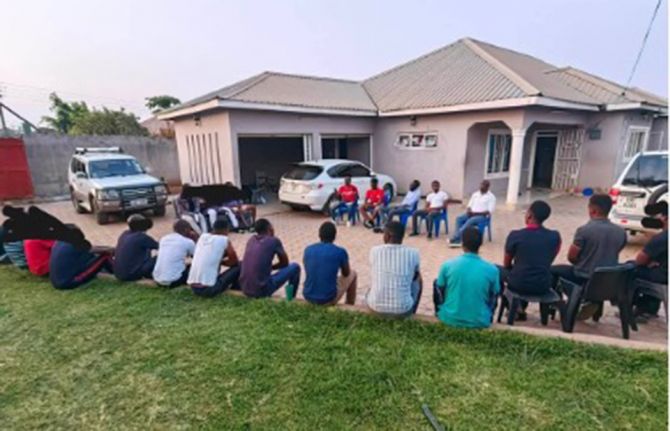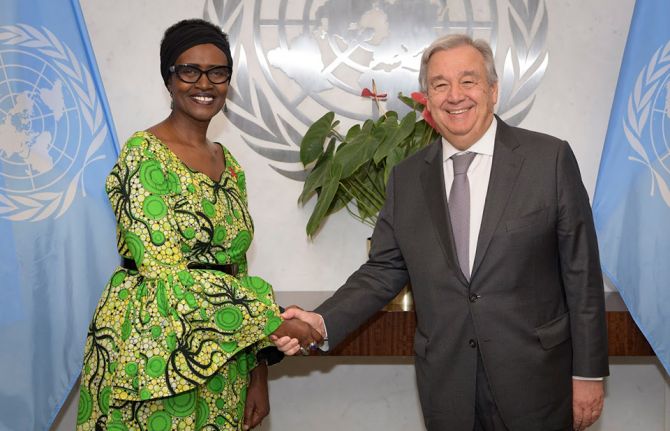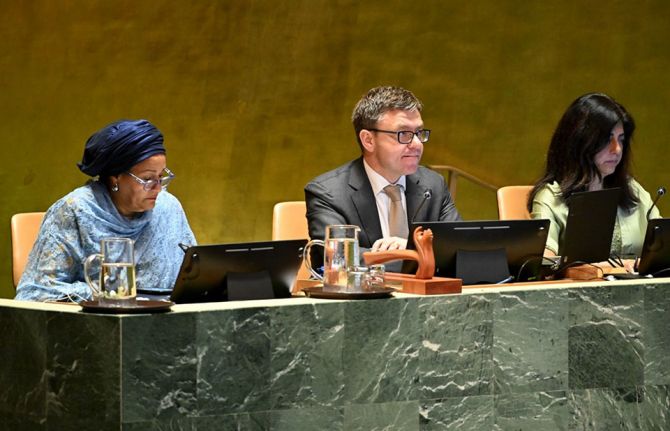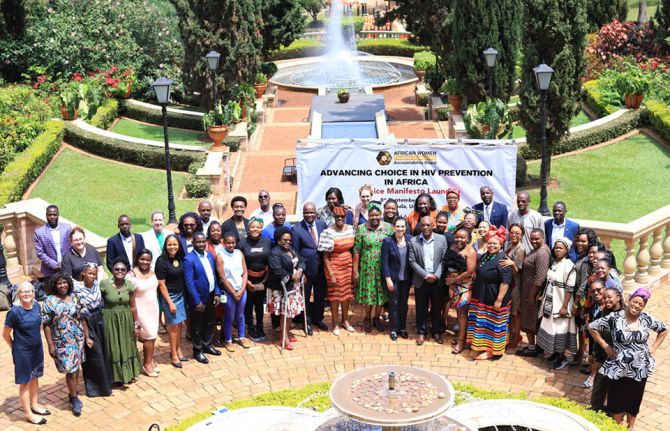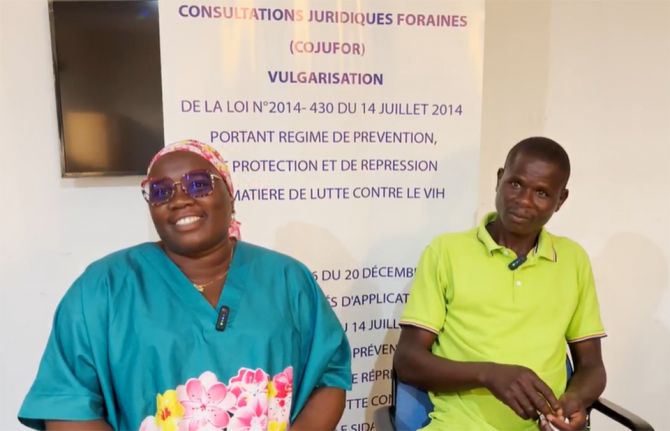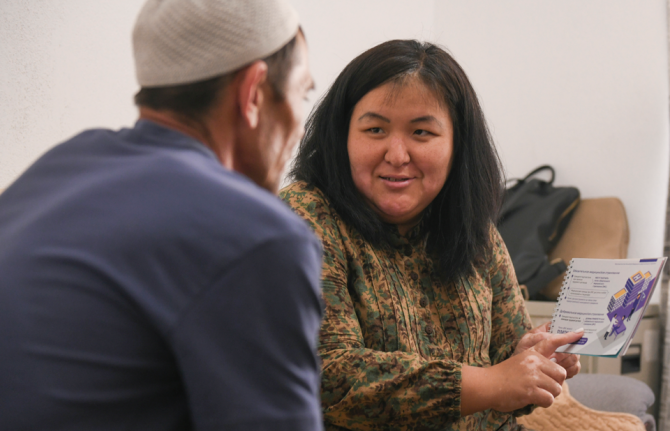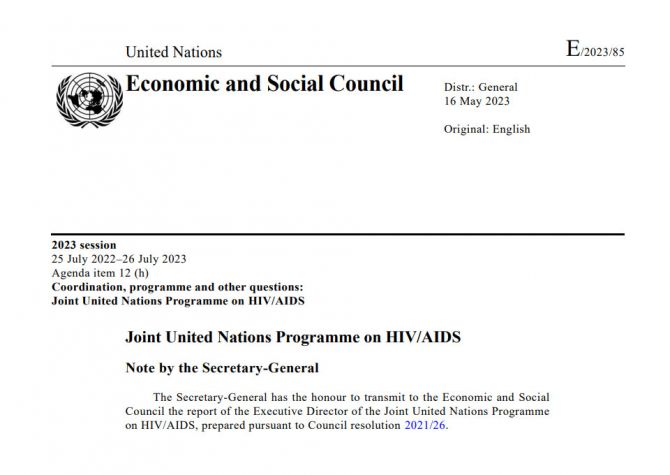
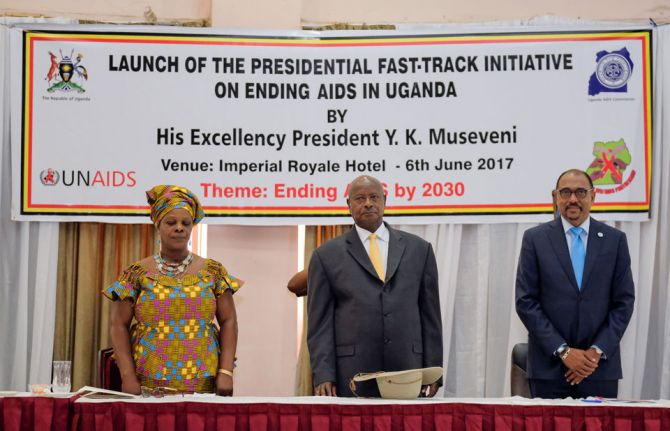
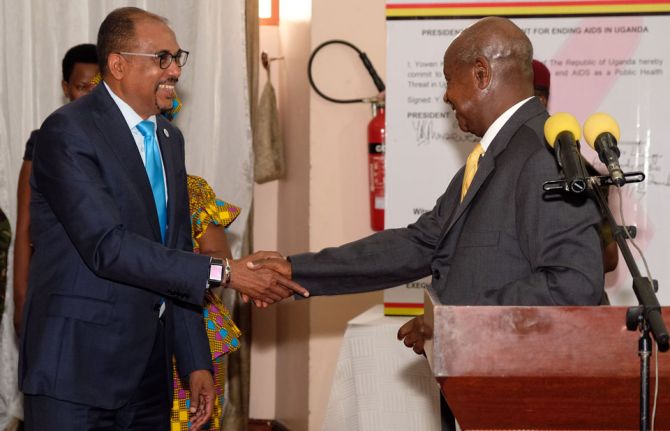
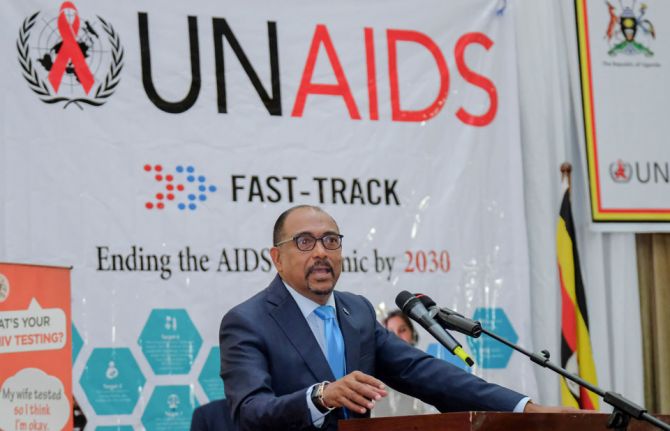
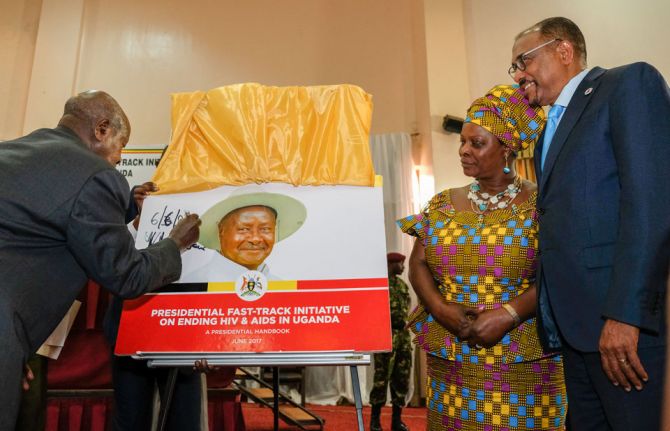
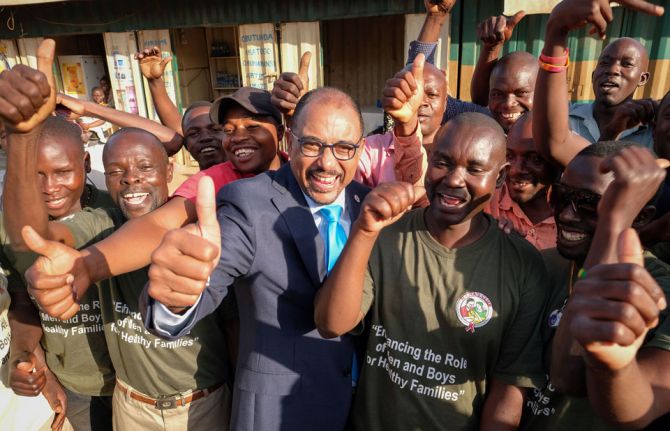
Update
President Museveni breaks the conspiracy of complacency
07 June 2017
07 June 2017 07 June 2017In Uganda in the late 1980s and early 1990s, the President, Yoweri Museveni, showed the world, through pioneering high-level political leadership, that it was possible to reverse the AIDS epidemic, and for many years new HIV infections declined in Uganda. New HIV infections were reduced from 150 000 in 1990 to 66 000 in 1998—an incredible decline of 56%. However, by the early 2000s, the AIDS epidemic had begun to rebound, and by 2009 had climbed back up to 130 000 new HIV infections per year, a devastating blow to the country’s efforts to push the epidemic into permanent decline.
In the past few years, steps have been taken to once again reduce the epidemic, and in 2015 new HIV infections had dropped to 83 000. However, a disproportionate number of adolescent girls and young women between the ages of 15 and 24 are being affected and around 360 are becoming newly infected every week.
President Museveni is ready to reclaim his leadership role in the AIDS response, and on 6 June in Kampala, Uganda, at an event attended by the UNAIDS Executive Director, Michel Sidibé, launched the Presidential Fast-Track Initiative on Ending AIDS as a Public Health Threat in Uganda by 2030. Dubbed “Kisanja hakuna mchezo” (no playing games), the initiative contains a five-point plan for more focused and urgent action to accelerate achieving control of the HIV epidemic in Uganda.
The plan will aim to revitalize HIV prevention, especially among adolescent girls and young women, and consolidate progress on elimination of mother-to-child transmission of HIV. It will also accelerate implementation of HIV testing and treatment for men, particularly to ensure they reach the 90–90–90 targets, address financial sustainability for the AIDS response and ensure institutional effectiveness for a multisectoral response.
The First Lady of Zambia, Esther Lungu, attended the launch to reaffirm her commitment to the AIDS response and that of the Organisation of African First Ladies against HIV/AIDS.
During a meeting with the First Lady of Uganda, Janet Museveni, who is also the Minister for Education, Mr Sidibé congratulated her for her commitment to the elimination of mother-to-child transmission of HIV. As a result of her personal drive, Uganda has experienced a 90% decline (from 2009 to 2015) in the rate of mother-to-child transmission of HIV, the highest of the 21 priority countries of the Global Plan towards the elimination of new HIV infections among children by 2015 and keeping their mothers alive.
Quotes
“I call upon men to go for voluntary HIV counselling and testing. If you find you are HIV-positive, take HIV treatment. It will not cure you, but when the virus is suppressed, you prolong your life. And you will not infect other people. This is something that must be done.”
“For the millions of people who are not here today, they will be happy that their President is back in the driving seat of the HIV response, launching the world’s first presidential Fast-Track initiative. Once again, Uganda is leading Africa and the world to demonstrate that we can end the AIDS epidemic. Under his leadership, Uganda is moving from breaking the conspiracy of silence to breaking the conspiracy of complacency.”
“In Uganda, new HIV infections in babies have fallen over 10-fold since 2010. I am happy to learn that the country is on a steady path to eliminate mother-to-child transmission. It is proof that we are committed to ending AIDS as a public health threat by 2030.”
“African First Ladies have worked extremely hard at an African and global level advocating for the AIDS response. We have brought attention to HIV and challenged stigma and discrimination, demanded that orphans be treated with dignity, that the unborn child should be saved and that no one is prevented from antiretroviral therapy. There is no looking back for the Organisation of African First Ladies against HIV/AIDS.”
Region/country
Related

Update
Partners come together for gender-responsive change management
08 June 2017
08 June 2017 08 June 2017Partners from across the United Nations system came together on 30 May in UNAIDS headquarters in Geneva, Switzerland, to discuss how behavioural, institutional and cultural change can accelerate progress for gender equality.
In her keynote speech, Jan Beagle, Deputy Executive Director of UNAIDS, emphasized that if change management is undertaken in a gender-responsive manner, barriers to gender equality in the workplace can be addressed and overcome. She shared the progress that UNAIDS has made in gender equality, including near gender parity among staff, 40% of UNAIDS country directors being female and 100% compliance with the performance indicators of the United Nations System-Wide Action Plan on Gender Equality and the Empowerment of Women. She also underlined the need to shift organizational cultures to empower staff everywhere. UNAIDS is taking gender out of isolation and mainstreaming equality and inclusion throughout the Secretariat.
Julian Braithwaite, Ambassador and Permanent Representative of the United Kingdom of Great Britain and Northern Ireland to the United Nations Office and other International Organizations in Geneva, who delivered the other keynote speech, reaffirmed the commitment of the United Kingdom to empowering women and girls, while emphasizing the importance of creating organizational cultures that uphold gender equality. He reflected on the potential of Geneva as an international hub for human rights, trade and humanitarian work that brings together the collective power of the United Nations and its Member States.
The participants represented the broad array of United Nations entities in Geneva, including senior advisers on human resources, change management and gender. The meeting was organized by the International Gender Champions Geneva, UNAIDS and the Permanent Mission of the United Kingdom of Great Britain and Northern Ireland to the United Nations Office and other International Organizations in Geneva.
The workshop is the first of a series of initiatives to be undertaken by UNAIDS and the Permanent Mission of the United Kingdom, who Co-Chair the International Gender Champions change management impact group. Through the impact group, the Co-Chairs seek to identify and overcome institutional barriers that prevent women’s influence and advancement in Geneva-based international organizations.
Quotes
“If we can better harness our collective power to achieve change that places gender equality and women’s empowerment at the centre, we will be a powerful force.”
“Transforming our organizations in ways that gender equality becomes embedded across structures, processes and levels is our collective responsibility. We need your commitment and your leadership and we also need you to bring others on board.”
“It’s time to change our institutional DNA and create the environments for genuine gender equality.”
Region/country


Update
AIDS Quilt Online launched on International Candlelight Memorial Day
08 June 2017
08 June 2017 08 June 2017AIDS Quilt Online was launched on International AIDS Candlelight Memorial Day, 21 May, by civil society in eastern Europe and central Asia. An online memorial, AIDS Quilt Online pays tribute to people who have died of AIDS-related illnesses as well as to the activists who have dedicated their lives to the response to HIV.
The site, which is supported by UNAIDS, provides an opportunity to create a digital quilt, accompanied by a small personal text. The fragments are collected into one large digital canvas. People can also share pictures of real woven quilts on a quilt gallery page.
AIDS Quilt Online continues the tradition of the NAMES Project Foundation, created in San Francisco, United States of America, in 1987 to remember people who have died from AIDS-related illnesses. The tradition of sewing blankets in memory of someone close was transformed into the AIDS Memorial Quilt. Stitched from a multitude of fragments, each symbolizing a person’s shortened life, the quilt became one of the iconic symbols of the AIDS response. Tens of thousands of memorial panels were sewn by friends, loved ones and family members.
Quotes
“We hope that such projects can draw public attention to the HIV epidemic, to the need of extended access to treatment, care and support for people living with HIV, as well as to the urgent call to stop any form of discrimination related to AIDS.”
“This project is a reminder of everyone who's not with us today as well as hope for a new generation as we combine our efforts to end the AIDS epidemic.”
AIDS Quilt Online
Region/country
- Eastern Europe and Central Asia
- Albania
- Armenia
- Azerbaijan
- Belarus
- Bosnia and Herzegovina
- Bulgaria
- Croatia
- Cyprus
- Czechia
- Estonia
- Georgia
- Hungary
- Kazakhstan
- Kyrgyzstan
- Latvia
- Lithuania
- Montenegro
- Poland
- Republic of Moldova
- Romania
- Russian Federation
- Serbia
- Slovakia
- Slovenia
- Tajikistan
- North Macedonia
- Türkiye
- Turkmenistan
- Ukraine
- Uzbekistan
Related

Update
Lulu Haangala Wood appointed UNAIDS Goodwill Ambassador for Zambia
06 June 2017
06 June 2017 06 June 2017UNAIDS has appointed the singer and television presenter Lulu Haangala Wood as a Goodwill Ambassador for Zambia.
Ms Haangala Wood will focus on awareness-raising on HIV prevention and on access to increasing access to treatment by young people and members of key populations. She will use her influence to reach young people and women and will work towards ensuring that no one is left behind in the AIDS response in the country.
Ms Haangala Wood is a passionate advocate for equal rights and women’s empowerment. In 2008, she started the #WeKeepMoving Foundation to work with adolescents and young women and support them with career development.
Quotes
“I am very honoured to become the UNAIDS Goodwill Ambassador for Zambia. I want to learn, to listen to people and help them share their messages.”
“Lulu’s role will be to use the vast set of information and data UNAIDS has and translate it into a language that is accessible and appealing to all, in line with the principle of leaving no one behind.”
Biography
Region/country

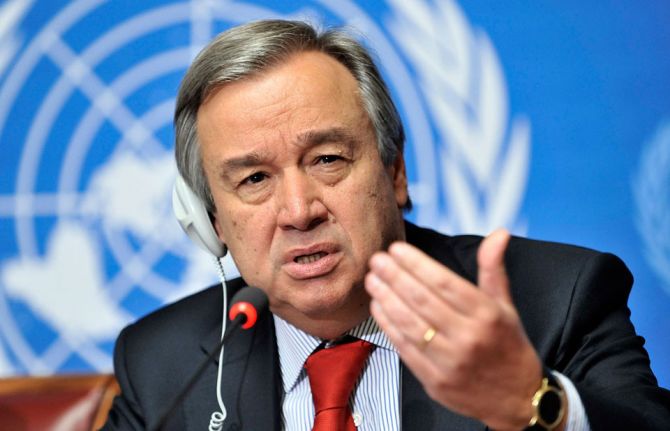
Update
Report of the United Nations Secretary-General
01 June 2017
01 June 2017 01 June 2017The report of the United Nations Secretary-General: Reinvigorating the AIDS response to catalyse sustainable development and United Nations reform will be presented to the United Nations General Assembly in New York, United States of America on 1 June at 10 a.m. New York time (3 p.m. GMT).
The report was presented by the Deputy Secretary-General of the United Nations, Amina Mohammed, on behalf of the United Nations Secretary-General, and serves to inform discussions around progress and challenges in achieving the bold targets and milestones set out in the United Nations Political Declaration on Ending AIDS, adopted by the United Nations General Assembly at its high-level meeting in June 2016.
The proceedings were opened by the President of the United Nations General Assembly, Peter Thomson, and were followed by statements from representatives of United Nations Member States.
Quotes
“In developing the Sustainable Development Goals, it was clear how relevant and innovative the approach to ending AIDS had been and how important it would continue to be. Achieving our aim on AIDS is interlinked and embedded within the broader 2030 Agenda for Sustainable Development. Both are grounded in equity, human rights and a promise to leave no one behind.”
“We have before us a critical window of opportunity to end the AIDS epidemic. But to do so we must take action now. Let us therefore seize the opportunity of today’s review to commit to accelerating our efforts to implement the Political Declaration on Ending AIDS, to achieving the 2030 Agenda for Sustainable Development and to creating a future where HIV and AIDS are consigned to the sorrows of the past.”
Related

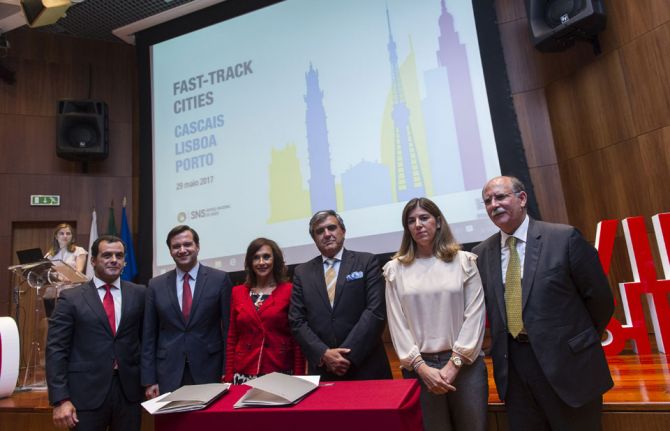
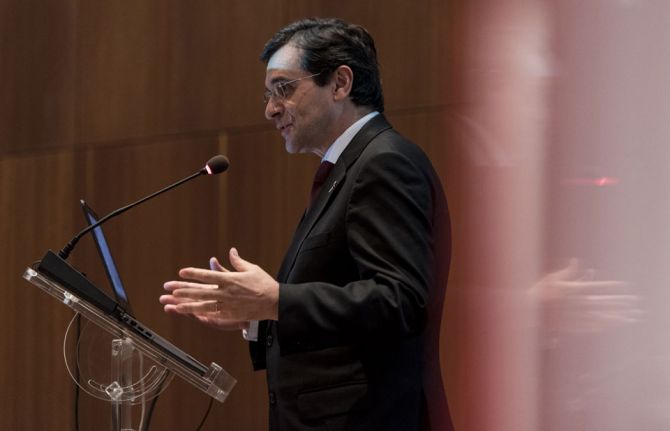

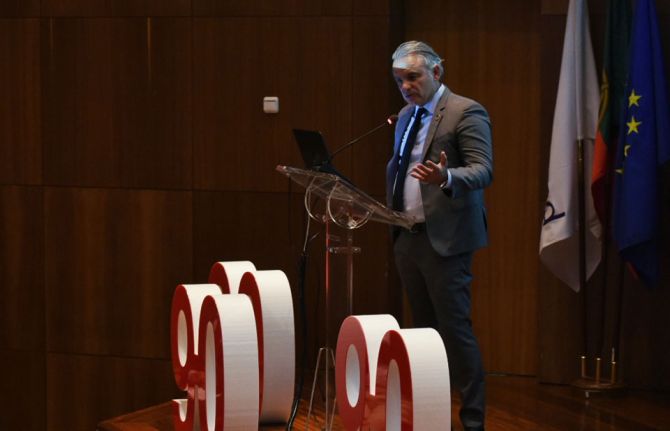
Update
Cascais, Lisbon and Porto sign the Paris Declaration on ending the AIDS epidemic in cities
31 May 2017
31 May 2017 31 May 2017The mayors of the Portuguese cities of Cascais, Lisbon and Porto have signed the Paris Declaration on ending the AIDS epidemic in cities—the first time that three cities in the same country have signed the declaration together.
In signing the Paris Declaration, mayors commit to putting their cities on the Fast-Track to ending the AIDS epidemic. The three mayors committed to achieving the 90–90–90 targets by 2020, whereby 90% of people living with HIV know their HIV status, 90% of people who know their HIV-positive status are accessing treatment and 90% of people on treatment have suppressed viral loads. They also committed to eliminating all forms of discrimination and developing a people-centred approach to the AIDS response, leaving no one behind.
During the signing ceremony, which took place on 29 May in Lisbon, Portugal, the Minister of Health of Portugal, Adalberto Campos Fernandes, reaffirmed the political commitment at the highest level to the response to HIV and highlighted that the 90–90–90 targets have a new impetus in the country.
The three cities will establish local strategies to remove barriers to accessing HIV services, eliminate discrimination and close the gaps to reaching the targets in the Paris Declaration. To that end, the Government of Portugal has put together a group of experts from government bodies, civil society and academia, who will identify and recommend concrete actions in the next 90 to 120 days.
During the event, the Director of the national AIDS programme, Isabel Aldir, presented the results of the national programme for HIV and tuberculosis for 2017. Ms Aldir said that in 2016, there were 841 new HIV infections in the country, the lowest for 15 years. Nonetheless, the plan for 2017 will focus on increasing the number of rapid tests by 15% and developing clinical guidance standards for the effective provision of pre- and post-exposure prophylaxis. The plan will also include preparing an evaluation report on a pilot project for dispensing HIV treatment in community pharmacies and promoting the implementation of the Fast-Track cities commitments.
Quotes
"Today is a historic day because, once again, Portugal proves that when we work together nothing is impossible. After winning the European Football Championship and the Eurovision Song Contest, it is now time to win the fight against AIDS. By working together, the government, city mayors, national health institutions, the social and private sector and civil society, we will build a better country, free of HIV and free of discrimination. Together we will always be stronger!"
"By joining the UNAIDS Fast-Track Cities global movement, Cascais has made a firm commitment to work towards the Sustainable Development Goals and to ending AIDS as a public health threat by 2030. The Cascais City Hall is proud to be working with SER+ Patient Association and other local and national partners in this project, promoting better health and more social justice for all our citizens."
“Portugal is an example of a successful response to AIDS that has put people’s needs first. Its success is based on a strong political leadership as demonstrated again here today, an inclusive legislation that protects people from discrimination and a very active civil society.”
“Political leadership is needed to facilitate access to health services, including for HIV, to migrant populations, whose HIV prevalence is increasing, especially in big cities. Portugal has become again a leading example on public health and human rights-based policies by removing all barriers on access to prevention, diagnosis and treatment of HIV, tuberculosis, viral hepatitis and sexually transmitted infections for undocumented migrants in 2017.”
“The International Association of Providers of AIDS Care welcomes the cities of Cascais, Lisbon and Porto as the most recent European cities to join the Fast-Track cities network. Working in collaboration with local stakeholders, including government officials, community representatives and clinical and service providers, we are convinced that these three cities can attain the 90–90–90 targets by 2020, thus assisting the country of Portugal to do so as well.”
Region/country
Related
 Government ensures continuity of treatment in Malawi
Government ensures continuity of treatment in Malawi

10 February 2025

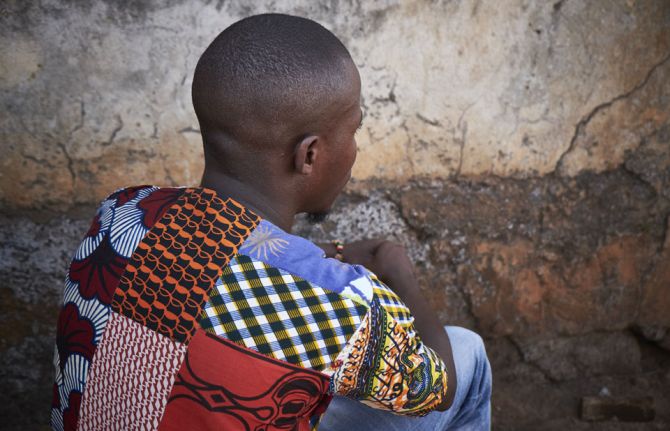
Update
Accelerating the AIDS response in western and central Africa
31 May 2017
31 May 2017 31 May 2017Only 1.8 million people of the 6.5 million people living with HIV in western and central Africa were on antiretroviral therapy at the end of 2015. This 28% treatment coverage of people living with HIV in the region contrasts with the 54% coverage in eastern and southern Africa in the same year.
In response to this HIV treatment shortfall in western and central Africa, UNAIDS, the World Health Organization (WHO) and other partners in the region have developed country emergency catch-up plans to accelerate the AIDS response. These plans call for tripling HIV treatment coverage within the next three years.
At a meeting on the sidelines of the 70th World Health Assembly to support the catch-up plan, health ministers and other representatives of countries in the region vowed to strengthen government leadership, make structural changes in their health systems and strengthen accountability.
The meeting, which was organized by the WHO Regional Office for Africa and UNAIDS, was attended by the health ministers of Benin, Burkina Faso, the Central Africa Republic, Chad, Côte d’Ivoire, Gabon, Liberia and Nigeria and representatives of Cameroon, Guinea and Sierra Leone. They all collectively agreed to put in place strong measures to accelerate HIV treatment in their countries.
All the participants agreed that health-service delivery models had to be transformed, notably by community health workers taking a bigger role in health-care delivery. WHO and UNAIDS will continue to work with the countries as they implement their plans for increasing access to HIV treatment.
UNAIDS is working with countries to achieve the commitment in the 2016 United Nations Political Declaration on Ending AIDS of ensuring that 30 million people living with HIV have access to treatment through meeting the 90–90–90 targets by 2020.
Quotes
“The situation is serious. We must pay close attention to western and central Africa. We must make sure that political leaders mobilize and focus their energies in these countries.”
“Renewed country momentum, under ministers’ leadership, to accelerate the response is critical as we move forward together to achieve the targets, while keeping people living with HIV at the centre of the response.”





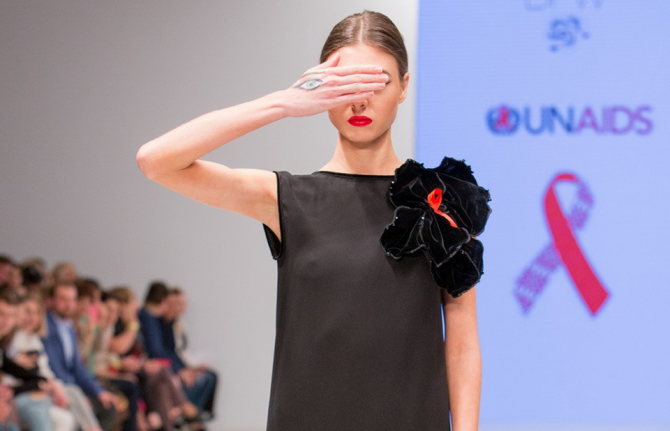
Update
Belarus Fashion Week concludes with the Fashion AIDS Line show
30 May 2017
30 May 2017 30 May 2017The Belarus Fashion Week, held in Minsk, Belarus, concluded with the Fashion AIDS Line show on 14 May. A competition for young designers established by the organizers of Belarus Fashion Week and the UNAIDS Belarus Country Office, Fashion AIDS Line promotes support for people living with and affected by HIV and eliminating HIV-related stigma and discrimination.
More than 20 of the country’s leading designers presented their work, inspired by the international symbol of the AIDS response—the red ribbon. All the models appeared in masks to symbolize the stigma faced by people living with HIV.
The award for the most original mask was won by Tanya Tur, while the award for the best performance was won by Tatiana Efremova. Ekaterina Kabanova was presented with the award for the best ethno-style designer, Igor Pletnev won the best idea award and Ekaterina Tikota won for “unity with UNAIDS”.
Historia Naturalis, Davidova and ScapegoaT_404 won the top prizes and will represent Belarus at the final Fashion AIDS Line show, to be held in Moscow, Russian Federation, in April 2018 at the VI Eastern Europe and Central Asia AIDS Conference.
Quotes
“Fashion AIDS Line is a new approach to drawing attention to HIV in Belarus.”
“Unfortunately, we are still campaigning for the rights of people living with HIV. Our models came out in masks. The fear of stigma and discrimination prevents many people getting tested for HIV. Therefore, our slogan is “Knowing your HIV status is fashionable!”
Region/country
Related
 Women, HIV, and war: a triple burden
Women, HIV, and war: a triple burden

12 September 2025
 Displacement and HIV: doubly vulnerable in Ukraine
Displacement and HIV: doubly vulnerable in Ukraine

11 August 2025

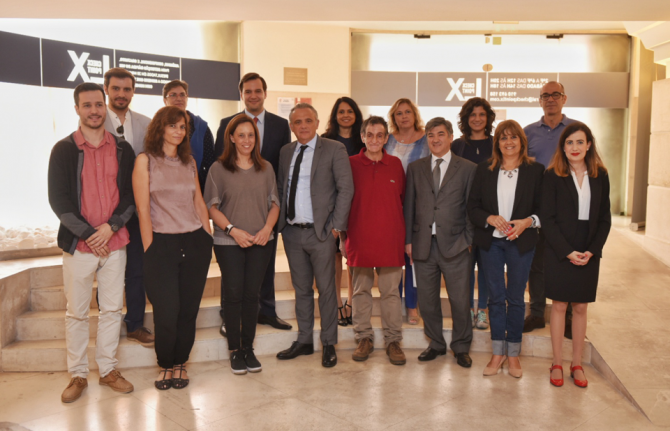
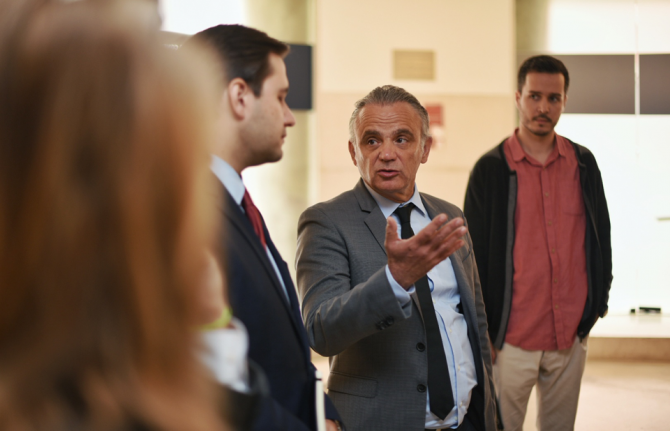
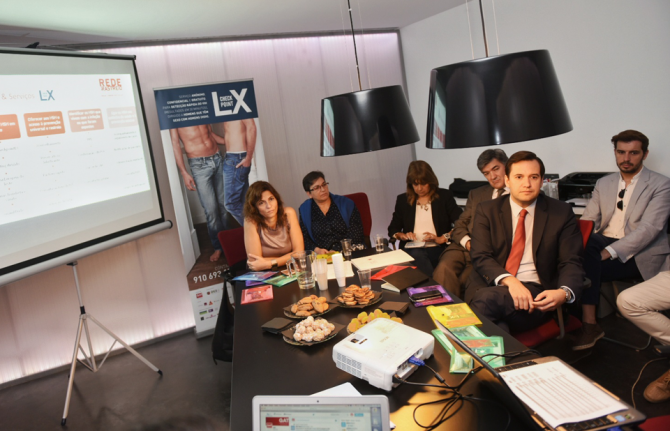
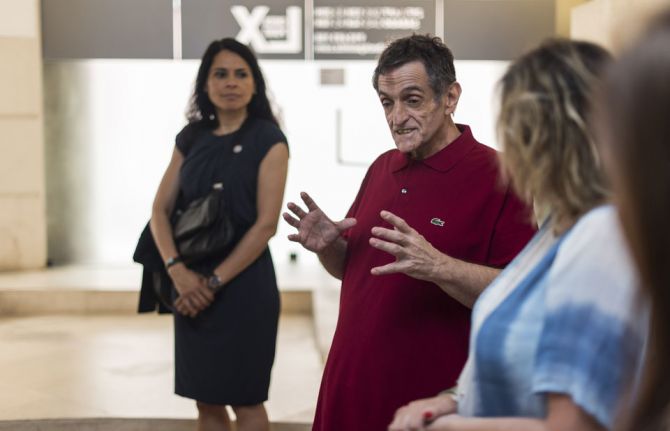
Update
Portugal: putting people at the centre of the AIDS response
30 May 2017
30 May 2017 30 May 2017Increased access to pre-exposure prophylaxis (PrEP) and HIV testing, together with the elimination of discrimination, are key to reducing new HIV infections in Portugal, representatives of civil society told UNAIDS Deputy Executive Director Luiz Loures in Lisbon, Portugal.
On 29 May, Mr Loures visited CheckpointLX, a community-based centre in Lisbon for men who have sex with men that offers rapid, confidential and free screening for HIV and other sexually transmitted infections, as well as counselling and referral to health care. During the visit, he discussed the challenges faced by civil society organizations in the response to HIV in the country.
The civil society representatives noted the progressive health policies that Portugal has regarding drug use, which are regarded as best practices in reducing new HIV infections among injecting drug users around the world. They also highlighted the importance of the current enabling legislation that is, for example, providing access to health services, including for HIV, to migrant populations regardless of their legal status, which puts Portugal at the forefront of the AIDS response in Europe.
The government’s political commitment to end AIDS by putting people at the centre of the response was further embodied by the Ministry of Health’s announcement on 29 May of the provision through the national health system of PrEP for key populations at higher risk of HIV infection, including gay men and other men who have sex with men and people who inject drugs, and for serodiscordant couples.
Nonetheless, challenges remain. Despite Portugal’s enabling legislation, the civil society representatives stressed the need to ease access to HIV prevention, diagnosis and treatment for migrant populations, given the raising HIV prevalence among migrants. The need to take a holistic approach in the provision of services, including screening for hepatitis, tuberculosis and sexually transmitted infections, was stressed. The representatives also noted that eliminating all forms of discrimination will be paramount to increasing access to services and to ending the AIDS epidemic as a public health threat by 2030.
UNAIDS is working with countries to achieve the commitment in the 2016 United Nations Political Declaration on Ending AIDS of ensuring access to combination prevention options, including pre-exposure prophylaxis, voluntary medical male circumcision, harm reduction and condoms, to at least 90% of people by 2020.
Quotes
“The HIV legislation in Portugal is a pathfinder for a broader protection of human rights. The provision of HIV services to migrants in the country is contributing to a more inclusive and safer society.”
“As a person living with HIV for the past 22 years, I strongly believe that we have all the elements needed to end AIDS in Portugal by 2030, and to achieve impressive results already by 2020.”
Region/country
Related

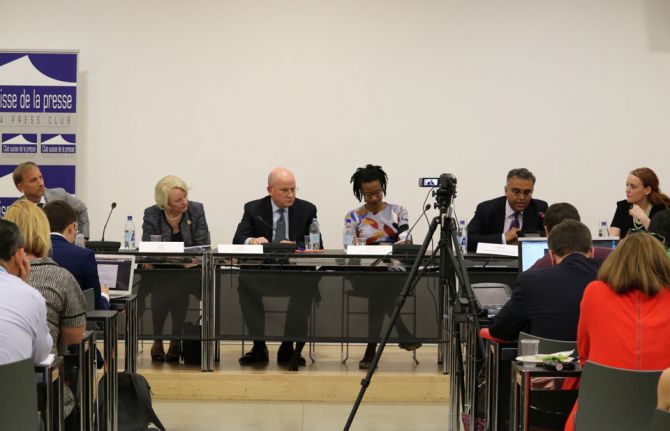
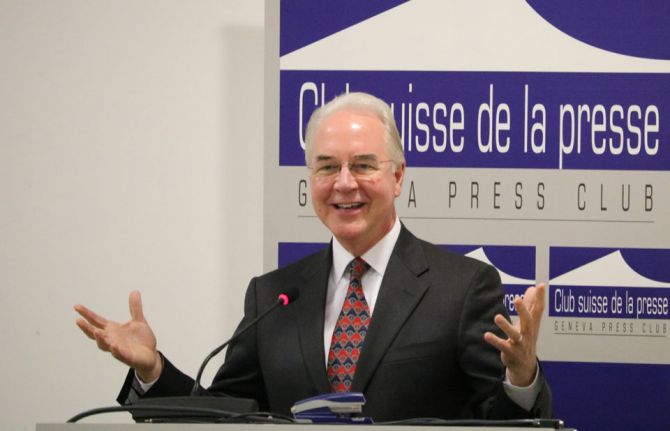
Update
Global health partners reflect on priorities for the new WHO Director-General
26 May 2017
26 May 2017 26 May 2017Global health partners came together on 23 May to reflect upon the key priorities for the new Director-General of the World Health Organization (WHO). Meeting on the sidelines of the 70th World Health Assembly, taking place in Geneva, Switzerland, from 22 to 31 May, the panellists shared recommendations for a stronger WHO, from pandemic preparedness and global health security, to United Nations reform and innovation in the Sustainable Development Goal (SDG) era.
Keynote remarks were made by Tom Price, United States Secretary of Health and Human Services, who emphasized that the United States of America strongly supports WHO and looks forward to working with the next Director-General to promote and achieve global health security. He underlined the need to ensure that decisions are made on the basis of science and emphasized the need to continue to make WHO more effective, transparent and efficient.
The panellists represented the broad array of multisectoral partners, including academia (Ashish Jha, the Director of the Harvard Global Health Institute), the nongovernmental organization community (Loyce Pace, the President and Executive Director of the Global Health Council), the private sector (John Flannery, the President and Chief Executive Officer of GE Healthcare), the Global Fund to Fight AIDS, Tuberculosis and Malaria (Mark Dybul, the Executive Director) and UNAIDS (Jan Beagle, Deputy Executive Director). The event was moderated by Jennifer Healy of the global law firm Dentons.
The panellists emphasized the need for the new Director-General to quickly articulate a compelling vision and strategy, together with clear prioritization, and facilitate buy-in of these, both inside and outside of the organization. The role of health within the SDGs and the focus on rapid emergency response were underlined.
Ms Beagle recognized the important role of WHO, a UNAIDS Cosponsor, and reflected on a number of key themes for consideration, including the importance of building inclusive, multisectoral partnerships and ensuring a focus on prevention, innovation and gender parity and women’s empowerment.
The recommendations of the panel will be shared with the incoming WHO Director-General, Tedros Adhanom Ghebreyesus.
Quotes
“The World Health Organization needs the brightest minds and skilled technicians to defeat diseases that are difficult to end, where we are on the cusp. It is critical we remain vigilant and finish the job—it will be a remarkable success for global health.”
“Enhanced multisectoral approaches will be critical. We cannot look at health in a silo—it has relevance and impact across the Sustainable Development Goals.”
“The World Health Organization’s primary goal is to achieve the highest attainable standard of health for everyone, everywhere. It is important for us to communicate this.”
“It will be important for the new World Health Organization’s Director-General to take time to listen, to hear and engage with stakeholders and constituents.”
“Focusing the strategy, and prioritizing, will be key. Strategy is also knowing what you “don’t do”, prioritizing—with Member States, with the Board—on the key areas that the World Health Organization will tackle.”
“It will be important to firm up, and articulate, the mission and vision, and get buy-in externally and throughout the organization, getting everyone feeling motivated when they go to work.”








